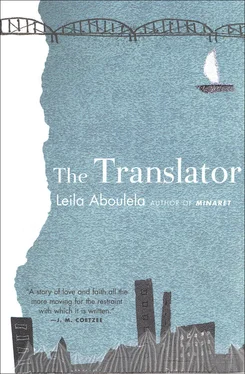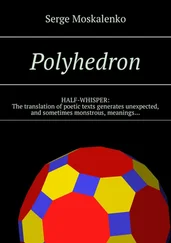Glass corridors led on to other rooms where there were tree barks, plants for sale in flower pots, giant mushrooms shaped out of stone. Back in the desert room, their bench was empty, the light welcomed her. No electric frog, no foliage, just the coarse, sparse aridity that was familiar to her from long ago.
The sound of running water was the rain against the glass. It was like the rain of her dream, her first dream of the present, the first time this grey landscape had found a place in her sleeping mind. Four years and her soul had dived into the past, nothing in the present could touch it. ‘But if you go home,’ Rae said, ‘you would find it hard to come back and I would not have a translator any more.’ She learnt, then, the meaning of his kindness. That he knew she was heavy with other loyalties, full to the brim with distant places, voices in a language that was not his own.
Christmas Day and everything was closed, shops, work, and the bus did not pass underneath the window of her flat. No snow, the pavements black with rain. A brief day, cold silver sandwiched between two nights. Empty streets, as if people were indoors asleep or the whole day was an extended dawn of a morning that would not start until the New Year. But Sammar knew that this was not true. Somewhere hidden away was the culmination of the serious shopping of the past weeks, trees, turkeys, families sitting on settees. Like in the pictures she had seen in magazines. Private people, she thought, made private by the cold. Celebrating indoors and the streets, instead of looking festive, look bleak without people.
She could hear the television from the flat downstairs. Lesley’s flat on the ground floor. The elderly lady turned it up because she could not hear so well now. Through the floorboards came applause and music, unique television sounds — the only thing not on holiday today. They kept Sammar company as the sounds of Lesley’s comings and goings usually did, more so than the other tenants. The front door opening and shutting, Lesley shaking out her umbrella on the mat. She was a war widow, living alone, robust small frame, unblemished white hair, friendly and alert.
Sammar had addressed her as Aunt once out of politeness, in the early days when she had come smarting and feverish from Khartoum, without Tarig, without Amir, only the grudge against her aunt. But otherwise a soft heart, too soft, sickly soft, so that when the elderly woman had replied, taken aback, ‘I’m not your aunt,’ all surprise in her tired hazel eyes, ‘Call me Lesley,’ Sammar cried from the landing to the first floor, silly, easy tears. Surface tears like the ones chopping onions produce, even though she had not been able to cry over her son’s head when she held him goodbye.
At three o’clock, when the day began to darken, she put the lights off so she could still look out of the window and not be seen. She drew loops through the condensation that clung to the glass panes, pushed with her finger drops that dribbled to the sill below. Could she trance herself to hear the azan? The sunset azan, almost as special as the dawn, when the muezzin added the words Prayer is better than sleep. She was fasting today, making up for days missed in Ramadan. It was easy to fast from the dawn at seven in the morning to the sunset at half-past three. Tarig would have joked about that. ‘Cheating,’ he would have said. ‘Too easy, it doesn’t count.’ She remembered him fasting Ramadan when he was twelve and still going swimming, riding his bicycle in the burning heat of the afternoon, defiant and a little crazy, wanting to prove he was strong. But they had all been like that, even the girls. Are you fasting? A cool Yeah, or just a nod, deliberately casual, like it was not a big thing. Though later in the month they would copy their mothers, my head aches, I can’t bear it. I have lost weight, I can hardly eat at night.
Now a little past three and Sammar counted, twenty minutes to go. She had a sheet of paper from the mosque with the times of prayer for each day. December 25th, maghrib was 15:31. She would eat a date first, drink water, pray, and then she would eat the rice she had made earlier, the rest of the beans she had cooked yesterday. Then she could spend the evening working for she had a lot of work to finish, before she went away.
She was going away in February to Egypt, part of the antiterrorist programme. She had been to the interview in London and seen in the file that the interviewer held before him, her completed application form, photocopies of her degree, Rae’s signature on the letter of reference. And she had answered all the questions confidently, as if she were strong, as if she were not afraid. At the back of her mind, the motivation, I will see home again. The job was for three weeks in which experts were going to interview members of extremist groups in Egypt and she was going to be the interpreter. After the three weeks were over, she would fly the two hours home, to Khartoum, and she would bring Amir back with her. All this needed organising, planning a new phase in her life. But the energy came, the recovery in limbs and parts of the mind that had not been used for a long time.
She had lived four years as if home had been taken away from her in the same way Tarig had. To see home again. It was a chandelier on the ceiling of her life, circles of lights. To see again the streets where Tarig had ridden his bike, and she had walked every day after school to him and Hanan, walking towards the airport, with her back to where the sun would later set. To go to where everything happened, her aunt’s house; laughter on their wedding, fire when she brought Tarig’s body home. Shimmering things. Painting with ice on the liver-red tiles, fearing stray dogs, in weddings dreaming of her own future wedding, visiting fortunetellers who threw shells on the dust and never answered the questions she was there to ask.
The sound of the television fell to a quiet, even murmur. The Queen’s Speech. Sammar thought that Rae would be listening to it now in Edinburgh, with his family, after the Christmas lunch in a room of red and green, in a scene like the ones she had seen in the fat catalogues that were pushed through the letter box for free. It would mean something to him, what his Queen said or did not say, in comparison to previous years. Sammar felt separate from him, exiled while he was in his homeland, fasting while he was eating turkey and drinking wine. They lived in worlds divided by simple facts — religion, country of origin, race — data that fills forms. But he doesn’t drink anymore, she reminded herself. He had told her that and it had been another thing which made him less threatening. Another thing which made him not so different from her. From the beginning she had thought that he was not one of them, not modern like them, not impatient like them. He talked to her as if she had not lost anything, as if she were the same Sammar of a past time. Talked to her in that way not once, not twice, but every time. So that she had been tempted to ask, in the moments when the mind loops and ebbs, where do you know me from, why are you different from everyone else. Tempted to say, I am not strong enough for this. It had been too much visiting him that day with Yasmin. Even the day at the Winter Gardens she had gone home with the blindness coming on suddenly, blurring out bits of the granite buildings and the cars on the road.
But in February she was going home, and she could change her plans, stay there forever and he would become a memory of someone who had once been kind to her. She would remember his timetable, lectures, tutorials, the names of the Ph.D. students whose theses he supervised. An earnest man from Sierra Leone, a lady from Algeria struggling with English, two English students who wore large glasses and took the tutorials for some of his classes. Sammar liked talking to them. Over lunches and coffees in the noisy University self-service, she would move the conversation towards him. Smile as they praised him or made fun of the way he always said, ‘And why is that?’ The words of the students took on a lyrical quality, to be hived away, to be memorised for no reason.
Читать дальше












